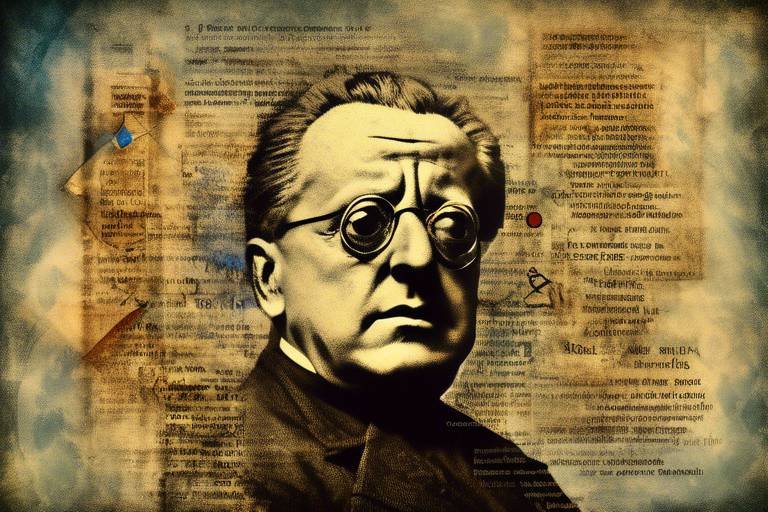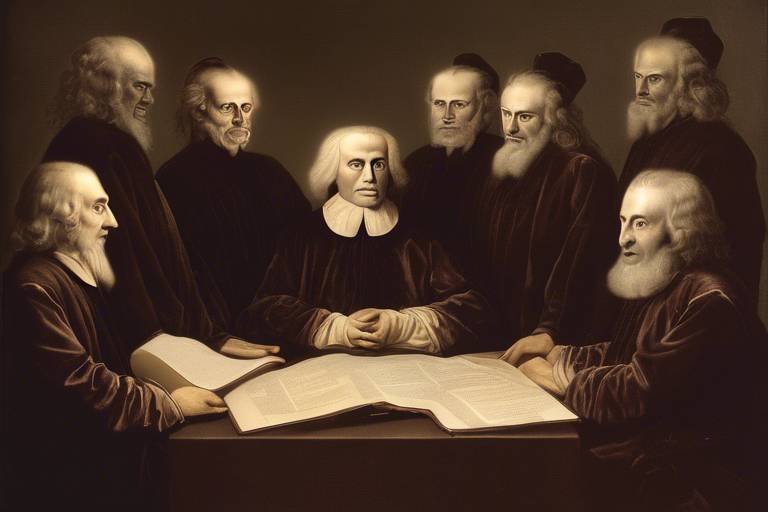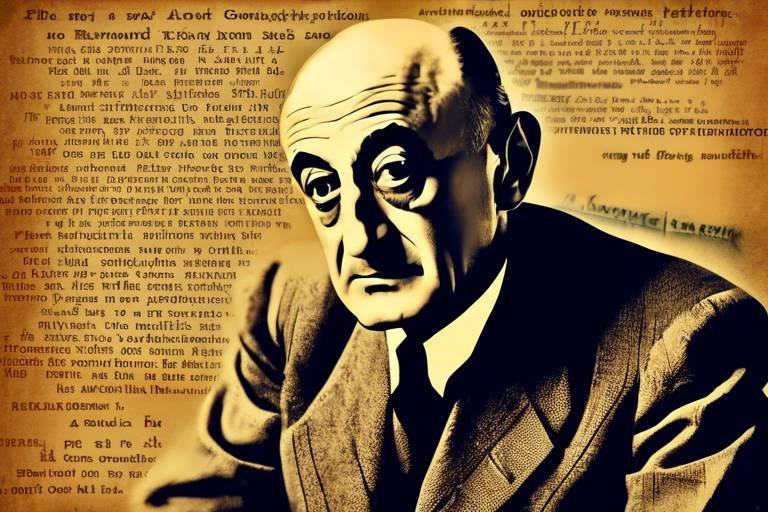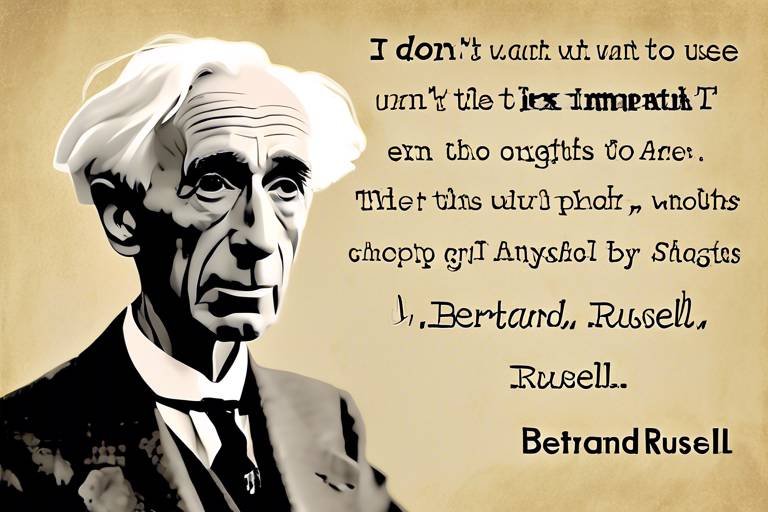Hannah Arendt: Thoughts on Evil, Love, and Power
Hannah Arendt, a towering figure in 20th-century philosophy, invites us to dive deep into the complex realms of evil, love, and power. Her ideas challenge us to rethink our understanding of moral responsibility and the nature of human relationships. Arendt's work is not just academic; it resonates with our daily lives, urging us to reflect on how we engage with the world around us. In a society often marked by division and conflict, her insights are more relevant than ever. So, what can we learn from her profound thoughts?
Arendt's exploration of evil is particularly striking because it defies traditional notions. Rather than viewing evil as something monstrous and incomprehensible, she presents it as a product of ordinary human behavior. This idea is most famously encapsulated in her concept of the banality of evil, which emerged from her observations of totalitarian regimes. Through her analysis, Arendt prompts us to reflect on our own moral responsibilities. Are we, too, capable of thoughtlessness in our daily lives? How often do we ignore the implications of our actions?
Arendt’s notion of the banality of evil illustrates a chilling reality: that ordinary people can become complicit in horrific acts simply by failing to think critically about their actions. This concept was vividly illustrated during the trial of Adolf Eichmann, a Nazi officer. Arendt observed that Eichmann was not a fanatical monster, but rather a bureaucrat who executed orders without question. This raises crucial questions about moral agency and the importance of critical thinking in our lives. Are we, like Eichmann, at risk of becoming mere cogs in a machine, neglecting our ethical obligations in the process?
During the Eichmann trial, Arendt noted how bureaucratic systems could desensitize individuals, leading to moral failures. Eichmann's defense was chillingly simple: he was just following orders. This case study serves as a powerful reminder of the need for vigilance and ethical engagement in our communities. It compels us to consider how easily we might fall into complacency, allowing systems of oppression to flourish unchecked. Arendt's insights challenge us to cultivate a culture of moral awareness and responsibility.
The concept of the banality of evil remains strikingly relevant today. In an age where information is abundant yet often superficial, the danger of thoughtlessness looms large. Arendt urges us to remain vigilant against complacency and to actively engage in ethical considerations. In a world rife with polarization and conflict, her call to action is clear: we must not only think critically about our own actions but also challenge the systems that enable injustice. This requires courage, empathy, and a commitment to fostering a more just society.
In contrast to her exploration of evil, Arendt's views on love offer a hopeful perspective on human relationships. She posits that love transcends personal connections, influencing our political engagement and community building. Love, in Arendt's philosophy, is not merely an emotion; it is a powerful force that can inspire collective action and resistance against oppressive systems. This raises an important question: how can we harness the power of love to foster solidarity and resilience in our communities?
Arendt's views on power are equally thought-provoking. She emphasizes the relational nature of power, distinguishing between power as a collective force and domination. This distinction reshapes our understanding of authority and governance in contemporary society. Power, for Arendt, is not merely about control; it is about the capacity to act together in pursuit of common goals. This perspective invites us to reconsider how we engage with authority and the structures that govern our lives.
Exploring the differences between authority and power, Arendt argues that true authority stems from mutual respect and consent. This stands in stark contrast to coercive forms of power that undermine democratic principles. In today's world, where authoritarianism is on the rise, Arendt's insights serve as a vital reminder of the importance of fostering genuine relationships built on trust and cooperation. How can we cultivate authority in our communities that empowers rather than oppresses?
Arendt's analysis of revolutions reveals the complexities of power dynamics. She illustrates how revolutionary movements can both liberate and constrain, depending on the motivations and structures established post-revolution. This duality invites us to reflect on the outcomes of our actions and the systems we put in place. Are we creating structures that promote freedom and justice, or are we merely replicating the systems of oppression we sought to dismantle?
- What is the banality of evil? The banality of evil refers to the idea that ordinary people can commit atrocious acts simply by failing to think critically about their actions.
- How does love influence political engagement? Arendt suggests that love fosters genuine connections, inspiring collective action and resistance against oppressive systems.
- What distinguishes authority from power? True authority comes from mutual respect and consent, while power can often be coercive and undermine democratic principles.
- Why are Arendt's ideas relevant today? Her insights challenge us to reflect on moral responsibility, the dangers of thoughtlessness, and the importance of ethical engagement in our communities.

The Concept of Evil in Arendt's Work
Hannah Arendt's exploration of evil is nothing short of revolutionary, challenging the conventional understanding that often paints evil as a monstrous, overt force. Instead, she dives deep into the murky waters of human behavior, particularly through her analysis of totalitarianism and what she famously termed the banality of evil. This concept suggests that evil acts can be perpetrated by ordinary individuals who fail to think critically about their actions, highlighting a disturbing yet profound truth about human nature.
Arendt's ideas prompt us to reflect on our own moral responsibilities in a world that often seems indifferent to injustice. She argues that it is not just the overtly malicious individuals who are responsible for evil acts; rather, it is the thoughtlessness of everyday people that can lead to catastrophic outcomes. This notion is particularly relevant in discussions surrounding moral responsibility, as it raises questions like, "How often do we blindly follow orders or societal norms without questioning their morality?"
To illustrate this point, consider the chilling case of Adolf Eichmann, a key figure in the Holocaust. Arendt's observations during his trial revealed how a seemingly mundane bureaucrat could facilitate unimaginable atrocities simply by adhering to the mechanistic demands of his job. This brings us to the core of Arendt's argument: the danger lies in the absence of critical thought and the failure to engage with the ethical implications of our actions.
Arendt's work serves as a cautionary tale, urging us to remain vigilant against the complacency that can arise from routine. She challenges us to cultivate a sense of moral awareness that goes beyond mere compliance with authority. In a society where the lines between right and wrong can become blurred, her insights are a powerful reminder that evil is not always loud and obvious; often, it lurks quietly in the background, waiting for our inaction to give it life.
The implications of Arendt's theories extend far beyond the historical context of her time. Today, as we navigate a world filled with complex political and social issues, her ideas about the banality of evil resonate with alarming relevance. It serves as a clarion call for individuals to engage actively in ethical considerations within their communities, reminding us that our choices, no matter how small, contribute to the larger tapestry of society.

Love and Its Political Implications
Hannah Arendt's exploration of love extends far beyond the personal realm, diving deep into how our intimate connections can shape and influence the political landscape. She argues that love is not merely a private affair but a powerful force that can inspire collective action and foster community bonds. Think about it: when people come together out of love—whether for family, friends, or a shared cause—they create a sense of solidarity that can challenge oppressive systems. This perspective invites us to consider how our relationships can act as catalysts for change in a fragmented world.
Arendt emphasizes that love encourages genuine connections among individuals, which can lead to a more engaged citizenry. When people care about one another, they are more likely to participate actively in their communities and advocate for justice and equality. In her view, love has the potential to transcend personal boundaries, allowing individuals to connect with broader social and political issues. This idea raises a thought-provoking question: How can we harness the power of love to foster social change in our own lives?
Moreover, Arendt’s philosophy challenges us to think about the implications of love in the context of civic responsibility. In a society where individuals often feel isolated or disconnected, the act of loving can be a revolutionary act in itself. It prompts us to engage with our neighbors, stand up for those who are marginalized, and build bridges instead of walls. As we navigate the complexities of modern life, the question remains: Can love be the antidote to the prevailing apathy we see around us?
To illustrate Arendt's point, consider the following table that outlines the transformative aspects of love in political life:
| Aspect of Love | Political Implications |
|---|---|
| Connection | Fosters community and solidarity. |
| Empathy | Encourages understanding and compassion for others. |
| Collective Action | Inspires movements for social justice and equality. |
| Resistance | Empowers individuals to stand up against oppression. |
In conclusion, Arendt’s insights into love and its political implications remind us that our personal relationships are deeply intertwined with our civic duties. Love can serve as a powerful motivator for social engagement, urging us to take action in the face of injustice. By nurturing love in our communities, we can cultivate a more just and equitable society. So, let’s ask ourselves: how can we let love guide our actions in the public sphere?
- What is the main idea of Arendt's philosophy on love?
Arendt believes that love transcends personal relationships and can inspire collective action and community engagement, influencing political life. - How does love contribute to social change?
Love fosters genuine connections and empathy, motivating individuals to advocate for justice and equality within their communities. - Can love be a political act?
Yes, Arendt argues that love can be a revolutionary act, prompting individuals to engage with societal issues and resist oppression.

The Banality of Evil
Hannah Arendt's concept of the banality of evil is one of her most provocative and thought-provoking ideas. It challenges our understanding of how ordinary people can become complicit in horrific acts without the overt presence of malice or hatred. Instead of depicting evil as something monstrous, Arendt suggests that it can be the result of mundane thoughtlessness. This perspective emerged prominently during her coverage of the trial of Adolf Eichmann, a key figure in the Nazi regime responsible for orchestrating the logistics of the Holocaust.
During the trial, Arendt observed Eichmann not as a fanatical monster but as a rather unremarkable individual who was more concerned with his job and adhering to orders than with the moral implications of his actions. This led her to conclude that the most dangerous aspect of evil is often its banality; it can manifest in the actions of those who fail to think critically about their roles in larger systems of oppression. Arendt’s observations serve as a stark reminder that evil can thrive in the absence of critical thought, where individuals become cogs in a bureaucratic machine, detached from the consequences of their actions.
To illustrate this concept further, consider the following points:
- Thoughtlessness: Arendt emphasizes that many individuals do not actively choose to commit evil acts; rather, they fail to engage in deep moral reasoning and thus become passive participants in a system that perpetuates injustice.
- Normalization of Evil: Over time, societies can normalize behaviors that are fundamentally unjust, making it easier for individuals to justify their actions as mere compliance with authority.
- Responsibility: The banality of evil raises critical questions about moral responsibility. If ordinary individuals can commit atrocious acts simply by failing to think critically, what does that mean for our own responsibilities in society?
Arendt’s analysis prompts us to reflect on our own roles within societal structures. Are we, too, at risk of becoming complicit in systems of evil through our inaction or thoughtlessness? The challenge lies in recognizing the potential for evil within the ordinary and ensuring that we cultivate a culture of critical engagement and ethical reflection. By doing so, we can guard against the insidious nature of thoughtlessness that allows evil to flourish.
Ultimately, the banality of evil serves as a cautionary tale, urging us to remain vigilant and actively question the moral implications of our actions and the systems we support. It reminds us that the fight against evil is not just about combating overt acts of cruelty but also about fostering a society where critical thinking and moral responsibility are paramount.
- What is the main idea behind the banality of evil?
The banality of evil suggests that ordinary people can commit horrific acts simply by failing to think critically about their actions and their implications. - How did Hannah Arendt illustrate this concept?
Arendt illustrated this concept through her observations of Adolf Eichmann during his trial, portraying him as a bureaucrat more concerned with following orders than with the morality of his actions. - Why is critical thinking important in preventing evil?
Critical thinking is essential because it encourages individuals to reflect on the ethical implications of their actions and to resist becoming passive participants in systems of oppression.

Case Study: Eichmann in Jerusalem
In her groundbreaking work, Eichmann in Jerusalem, Hannah Arendt provides a compelling analysis of the trial of Adolf Eichmann, a key figure in orchestrating the Holocaust. This case study serves as a crucial lens through which we can explore her concept of the banality of evil. Arendt attended the trial in 1961, where she was struck not by the monstrousness of Eichmann’s actions but rather by his ordinariness. He was not a fanatic or a sociopath; instead, he appeared to be a bureaucrat who was simply following orders, embodying what she termed the "banality" of evil.
Arendt's observations reveal a chilling truth: evil can be committed by ordinary people who fail to think critically about their actions. Eichmann's defense was rooted in his assertion that he was merely doing his job, highlighting a disturbing disconnect between moral responsibility and bureaucratic duty. This raises profound questions about individual accountability in the face of systemic wrongdoing. Are we, too, capable of such thoughtlessness? Are we willing to sacrifice our moral compass for the sake of conformity?
Throughout the trial, Arendt noted several key aspects of Eichmann's personality and behavior that illustrate her thesis:
- Unremarkable demeanor: Eichmann was described as a somewhat dull individual, lacking the fervor typically associated with evil. His monotonous speech and bureaucratic mindset painted a picture of someone who had lost touch with the moral implications of his actions.
- Failure to empathize: Eichmann exhibited a shocking inability to connect with the suffering of others. His focus was on logistics and efficiency rather than the human cost of his decisions, emphasizing the dangers of a detached, administrative approach to governance.
- Just following orders: This phrase encapsulated Eichmann's defense, which resonates with the historical context of totalitarian regimes. It prompts us to reflect on the extent to which individuals justify their actions when they are part of a larger system.
Arendt's analysis of Eichmann challenges us to confront uncomfortable truths about human behavior. It compels us to ask ourselves: how often do we turn a blind eye to injustice in our own lives? How easily can we become complicit in systems that perpetuate harm? The trial serves as a stark reminder that the capacity for evil lies not only in the hands of a few but can seep into the fabric of society when individuals choose to remain passive.
Moreover, the implications of Arendt's work extend far beyond the historical context of the Holocaust. In today's world, where moral dilemmas abound, her insights serve as a call to action. We must cultivate a culture of critical thinking and ethical engagement. By doing so, we can resist the allure of thoughtlessness that allows evil to flourish in our communities.
In conclusion, Arendt's examination of Eichmann in Jerusalem is not merely a historical account; it is a profound exploration of the human condition. It urges us to recognize our potential complicity in evil and challenges us to embrace our moral responsibilities. As we navigate an increasingly complex world, her insights remain as relevant as ever, reminding us that the fight against evil begins with the courage to think critically and act with integrity.

Implications for Modern Society
Hannah Arendt's concept of the banality of evil resonates powerfully in our contemporary world, where the danger of complacency lurks in everyday life. In an age where information is abundant yet often superficial, Arendt's insights challenge us to engage deeply with the moral implications of our actions. Are we, like Eichmann, capable of committing atrocities through mere thoughtlessness? This question is not just a philosophical musing; it is a call to action for individuals to cultivate a critical consciousness.
In today's society, we witness numerous instances where individuals become desensitized to injustice, often due to the overwhelming nature of global issues. From climate change to systemic racism, the complexity of these challenges can lead to a sense of helplessness. Arendt urges us to recognize that our inaction can be as harmful as direct participation in evil. This is where her ideas about moral responsibility become crucial. We must ask ourselves: How can we actively participate in our communities to foster a culture of ethical engagement?
To illustrate this, consider the following table that outlines the implications of Arendt's philosophy for modern society:
| Implication | Description |
|---|---|
| Critical Thinking | Encourages individuals to question norms and challenge the status quo, fostering a more engaged citizenry. |
| Community Responsibility | Highlights the importance of collective action in confronting social injustices and promoting ethical governance. |
| Awareness of Power Dynamics | Promotes understanding of how power operates in society, encouraging vigilance against authoritarianism. |
Moreover, Arendt's ideas prompt us to consider our relationships with others. Love, as she posits, has the potential to inspire political engagement. When we form genuine connections, we are more likely to mobilize and resist oppressive systems. In a fragmented world, the act of building community becomes a revolutionary act in itself. It is through these connections that we can collectively challenge the complacency that Arendt warns against.
In conclusion, the implications of Arendt's work for modern society are profound and multifaceted. They call for a re-examination of our roles as citizens and moral agents. By fostering critical thinking, embracing community responsibility, and nurturing our connections with others, we can combat the banality of evil and cultivate a more just and compassionate world.
- What is the banality of evil? The banality of evil is a concept introduced by Hannah Arendt, suggesting that ordinary people can commit heinous acts simply by following orders or conforming to societal norms without critical reflection.
- How does love relate to political engagement? Arendt argues that love fosters genuine connections that can inspire collective action and resistance against oppressive systems, highlighting the transformative power of personal relationships in the public sphere.
- Why is critical thinking important in today's society? Critical thinking is essential as it empowers individuals to question norms, challenge injustices, and make informed decisions rather than passively accepting the status quo.

The Role of Love in Political Life
In the intricate tapestry of human existence, love emerges as a powerful thread that weaves together personal relationships and political engagement. Hannah Arendt, a profound thinker, asserts that love is not merely a private affair; it spills over into the public sphere, shaping our civic responsibilities and community dynamics. Imagine love as a catalyst, igniting passion and commitment among individuals, prompting them to act not just for themselves but for the greater good. In a world often marked by division and discord, Arendt's insights challenge us to consider how love can serve as a unifying force in our political lives.
Arendt's perspective invites us to reflect on the essence of love as a transformative power. It fosters genuine connections between people, creating a sense of solidarity that can inspire collective action against oppression. When individuals are bound by love—whether it be for family, friends, or fellow citizens—they are more likely to stand up for one another, advocating for justice and equality. In this light, love transcends mere emotion; it becomes a political act, a declaration of our shared humanity.
Consider the impact of love on civic engagement. When communities are built on love and mutual respect, they become fertile grounds for activism and change. Such environments encourage individuals to voice their concerns, participate in discussions, and mobilize for social justice. Love, therefore, does not just shape individual actions; it cultivates a culture of responsibility where citizens feel compelled to engage with the political landscape actively.
However, Arendt also warns us that love can be a double-edged sword. While it has the potential to inspire, it can also lead to exclusion if not approached with an open heart. When love becomes insular, focusing solely on a select group, it risks fostering division rather than unity. This paradox highlights the importance of a love that is inclusive, one that extends beyond personal relationships to embrace the broader community. It is this expansive view of love that Arendt champions, urging us to forge connections that bridge divides and promote understanding.
The interplay between love and political life raises essential questions:
- How can love inform our political decisions?
- In what ways can communities cultivate love as a foundation for civic engagement?
- What are the risks of allowing love to become a tool for exclusion?
Ultimately, Arendt’s exploration of love within the political context encourages us to rethink our roles as citizens. It challenges us to embrace love not just as an emotion but as a guiding principle that can lead to transformative action. By fostering connections grounded in love, we can create a more just and equitable society—one where individuals are motivated to act not just for themselves, but for the collective good. In times of crisis or uncertainty, it is love that can light the way forward, reminding us of our shared responsibilities and the potential for change that lies within each of us.

Power Dynamics in Arendt's Philosophy
Hannah Arendt's exploration of power is nothing short of revolutionary. She delves deep into the nuances of power dynamics, challenging us to rethink our conventional understanding of authority and governance. For Arendt, power is not merely a tool wielded by those in control; rather, it is a relational force that emerges through collective action and shared goals. This perspective invites us to consider how power can be both a unifying and divisive force within society, depending on the motivations and intentions behind it.
One of the most compelling aspects of Arendt's philosophy is her distinction between authority and power. While power can be seen as the ability to enforce one's will, authority is rooted in mutual respect and consent. In her view, true authority arises from the recognition of legitimacy by the governed, creating a stable foundation for governance. This contrasts sharply with coercive power, which often relies on fear and manipulation, ultimately undermining democratic principles. Arendt's insights compel us to question: What kind of power do we want to cultivate in our communities?
Arendt also offers a profound analysis of revolutions, illustrating the dual nature of power dynamics within these transformative events. Revolutions can serve as a catalyst for liberation, but they can also lead to new forms of oppression if the underlying motivations are not aligned with the principles of freedom and equality. For instance, the aftermath of a revolution often reveals the complexities of power structures that emerge, which can either uphold or dismantle the very ideals that sparked the revolutionary fervor. This duality raises critical questions about the sustainability of revolutionary change and the responsibilities of those who participate in such movements.
To further understand Arendt's perspective, consider the following table that summarizes key differences between authority and power:
| Aspect | Authority | Power |
|---|---|---|
| Source | Mutual respect and consent | Ability to enforce will |
| Nature | Relational and collective | Can be coercive or collaborative |
| Impact | Stability and legitimacy | Can lead to oppression or liberation |
In summary, Arendt's examination of power dynamics invites us to engage in a deeper dialogue about the nature of authority and the responsibilities that come with it. Her work challenges us to reflect on how we can foster a culture of genuine authority—one that promotes collective well-being and encourages active participation in democratic processes. As we navigate the complexities of modern society, Arendt's insights serve as a crucial reminder of the transformative potential of power when it is rooted in respect and shared values.
- What is the difference between power and authority according to Arendt?
Arendt distinguishes power as the ability to enforce one's will, while authority is based on mutual respect and consent. - How does Arendt view revolutions?
She sees revolutions as complex events that can lead to both liberation and new forms of oppression, depending on the motivations behind them. - Why is critical thinking important in Arendt's philosophy?
Critical thinking is essential to avoid the pitfalls of thoughtlessness that can lead to moral failures and the normalization of evil.

Authority vs. Power
When delving into the intricate world of politics and governance, one cannot overlook the profound distinctions between authority and power. Hannah Arendt, a towering figure in political philosophy, offers a lens through which we can better understand these concepts. To her, authority is not merely a tool of governance; it is a relational phenomenon that arises from mutual respect and consent among individuals. This contrasts sharply with the idea of power, which can often be coercive and imposed from above, leading to a disconnect between rulers and the ruled.
Arendt emphasizes that true authority is rooted in the recognition and acceptance of a leader's legitimacy by the governed. It is a kind of social contract where the populace grants authority based on shared values and trust. In this way, authority fosters a sense of community and collective responsibility, enabling individuals to come together for a common cause. On the other hand, power, particularly in its coercive form, can lead to fear and compliance rather than genuine allegiance. When people are compelled to follow out of fear, the social fabric begins to fray, and the potential for rebellion grows.
To illustrate this difference, consider the following table:
| Aspect | Authority | Power |
|---|---|---|
| Source | Mutual respect and consent | Coercion and force |
| Nature | Relational and communal | Hierarchical and individualistic |
| Impact on Society | Fosters community and engagement | Creates division and fear |
Arendt's insights prompt us to reflect on our own political systems and the nature of our leaders. Are they exercising authority based on respect and shared ideals, or are they merely wielding power through intimidation? This question becomes especially pertinent in times of social unrest, where the legitimacy of authority is often challenged.
In our modern context, the implications of Arendt's distinction are profound. As citizens, we must be vigilant in recognizing the difference between leaders who inspire through authority and those who rule through power. The former encourages participation and dialogue, while the latter often leads to apathy and disengagement. By understanding these dynamics, we can better navigate our roles within the political landscape and advocate for systems that prioritize authority rooted in respect and consent.
- What is the main difference between authority and power? Authority is based on mutual respect and consent, while power can often be coercive and imposed.
- How does Arendt's concept of authority apply to modern politics? It encourages us to seek leaders who inspire trust and community rather than fear and compliance.
- Can power ever be justified? While power can be necessary for governance, it should always be balanced with authority to ensure a healthy political environment.
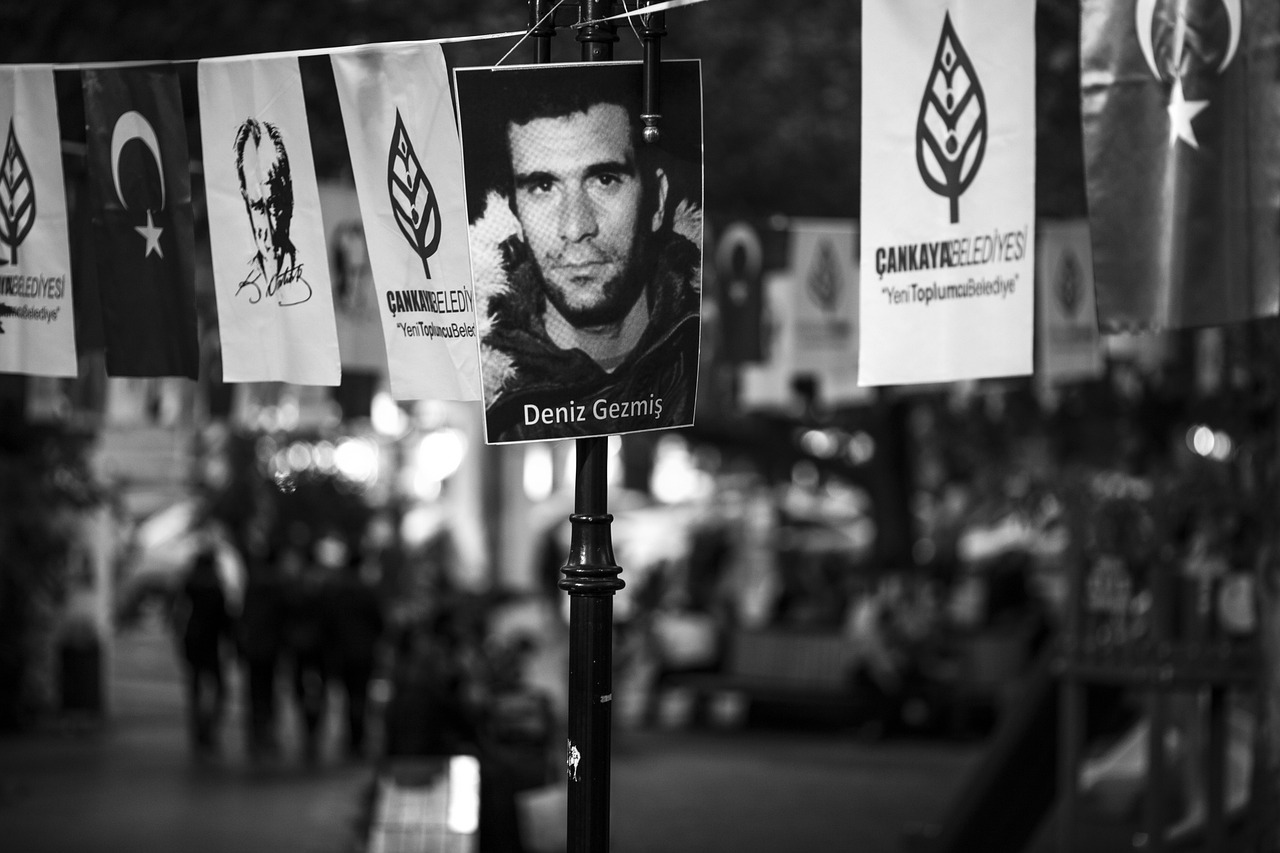
Revolutions and the Nature of Power
Hannah Arendt’s examination of revolutions provides a profound insight into the complexities of power dynamics. She argues that revolutions are not merely spontaneous eruptions of social unrest; rather, they are intricate processes that can lead to both liberation and oppression. When we think of revolutions, images of crowds rallying for change often come to mind, but Arendt urges us to look deeper. What motivates these movements? How do they reshape the power structures in place? These questions are crucial for understanding the dual nature of revolutions.
One of Arendt's key observations is that revolutions often arise from a collective desire for freedom and justice. However, the outcomes can vary significantly based on the underlying motivations and the frameworks established after the upheaval. For instance, a revolution that starts with noble intentions can devolve into tyranny if the new power structures do not prioritize democratic principles. This is where Arendt's distinction between power as a collective force and domination becomes particularly relevant.
To illustrate this point, consider the following table that outlines different revolutionary outcomes based on their foundational principles:
| Revolution | Foundational Principle | Outcome |
|---|---|---|
| American Revolution | Liberty and Rights | Formation of a democratic republic |
| French Revolution | Equality and Brotherhood | Rise of authoritarian regimes |
| Russian Revolution | Workers' Rights | Establishment of a totalitarian state |
As we can see, the foundational principles guiding a revolution significantly influence its trajectory. The American Revolution, rooted in the principles of liberty and rights, led to the establishment of a democratic republic. In contrast, the French and Russian Revolutions, despite their initial aspirations for equality and workers' rights, resulted in oppressive regimes. This highlights Arendt’s argument that revolutions can be a double-edged sword.
Moreover, Arendt emphasizes that the nature of power in revolutions is inherently relational. It is not simply about who has power over whom; it is about the connections and agreements formed between individuals in a society. When revolutions succeed in fostering genuine relationships built on mutual respect and consent, they can lead to a more equitable distribution of power. Conversely, when power is seized through coercion or violence, it often leads to further alienation and conflict.
In the aftermath of a revolution, the challenge lies in maintaining the initial spirit of the uprising. Arendt's analysis serves as a reminder that the work of creating a just society does not end with the overthrow of an oppressive regime. Instead, it requires ongoing vigilance, active participation, and a commitment to democratic ideals. As citizens, we must ask ourselves: How can we ensure that the power structures we establish after a revolution reflect the values we fought for?
In conclusion, Arendt’s insights into revolutions and the nature of power compel us to think critically about the processes of change in society. They challenge us to recognize that the journey toward freedom is not a straight path; it is filled with complexities that require thoughtful engagement and a commitment to ethical governance.
- What is the main idea behind Arendt's concept of power?
Arendt distinguishes between power as a collective force that emerges from cooperation and domination, which relies on coercion and control. - How does Arendt view the outcomes of revolutions?
She believes that revolutions can lead to both liberation and oppression, depending on the foundational principles and structures established post-revolution. - What role do personal relationships play in Arendt's philosophy?
Arendt emphasizes that genuine connections fostered through love can inspire collective action and resistance against oppressive systems.
Frequently Asked Questions
- What is Hannah Arendt's concept of evil?
Hannah Arendt's concept of evil, particularly her idea of the "banality of evil," suggests that ordinary people can commit horrific acts without a deep-seated malevolence. This challenges the traditional view of evil as something monstrous and highlights the dangers of thoughtlessness and moral disengagement in society.
- How does Arendt relate love to political engagement?
Arendt believes that love extends beyond personal relationships, playing a crucial role in political life. She argues that love fosters genuine connections among individuals, which can inspire collective action and help build resilient communities, especially in times of social fragmentation.
- What is the significance of the Eichmann trial in Arendt's work?
The Eichmann trial is significant in Arendt's work as it exemplifies her ideas about the banality of evil. Her observations during the trial revealed how bureaucratic systems could desensitize individuals, leading them to commit moral atrocities while appearing to follow orders, thus raising questions about personal responsibility.
- How does Arendt define power in her philosophy?
In Arendt's philosophy, power is seen as a relational force that emerges from collective action and agreement among people. She distinguishes between power, which is rooted in mutual respect and consent, and domination, which relies on coercion and undermines democratic values.
- What are the implications of Arendt's ideas for modern society?
Arendt's ideas, particularly the notion of the banality of evil, remain relevant today as they encourage individuals to be vigilant against complacency. Her work urges us to actively engage in ethical considerations and to reflect on our roles within our communities to prevent moral failures.
- What does Arendt say about revolutions and power dynamics?
Arendt's analysis of revolutions illustrates the complexities of power dynamics, showing that while revolutions can liberate, they can also impose new constraints. The motivations behind revolutionary movements and the structures established afterward are crucial in determining whether they lead to genuine freedom or new forms of oppression.





